Parish Share Explained
Introduction
The Diocese of Portsmouth is a family of interlocking communities, including church congregations, church schools and chaplaincies. It’s a living network of people in which we seek God’s Kingdom, and aspire for all to experience a life-transforming encounter with Jesus Christ. It includes the 8,000 or so worshippers in the 129 parishes, as well as 38 Church of England schools and five academies. ‘The diocese’ is not the small team who support this work from our diocesan offices, but all of us in parishes and schools working together for the Kingdom.
We support each other practically, spiritually and financially. The most obvious way in which we rely on each other is parish share, which allows us to support mission and ministry in every corner of our diocese, regardless of the wealth of local congregations and communities. Committing ourselves to contribute to a central pot is just one of the ways in which we express our own discipleship and our commitment to each other as fellow disciples.
Where we spend our money
As a diocese, we spent a total of £6.9m in 2022 from our unrestricted funds, of which £4.3m was used to provide stipendiary clergy to serve in parishes, and to support all of our clergy and lay ministers.
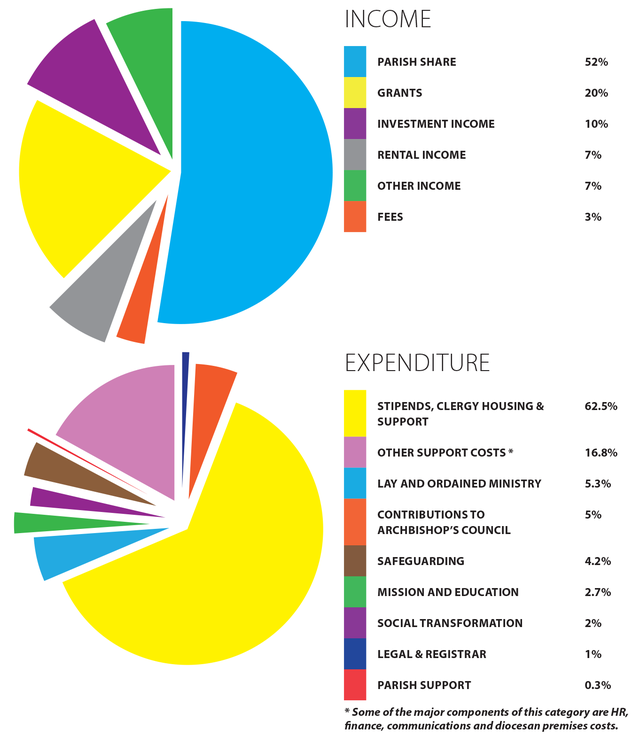
We recognise that ministry and mission is delivered most effectively in our parishes and church schools, and our budget is shaped towards providing as many people as possible on the frontline. So around two-thirds of the parish share we collect goes back to parishes in the form of stipends and support for our clergy. This includes spending money on clergy pensions, clergy housing, and training for current and future clergy and lay ministers.
Some of our budget goes towards a team of full and part-time diocesan staff (currently 26 FTE) whose focus is to support the work of our parishes and church schools from our diocesan offices. This also includes:
- support in safeguarding to help keep children, young people and vulnerable adults safe;
- support for stewardship and generous giving, including the provision of the Parish Giving Scheme and processing of gift aid claims;
- support for parishes in revamping their communications, including the hosting and support of parish websites;
- support for our church schools in recruitment, buildings, governance, collective worship, RE and Christian ethos;
- support in developing our church buildings, including applications for funding and carbon net zero initiatives;
- support for detailed legal queries from parishes and clergy;
…and much more, without which parishes and church schools would be unable to operate.
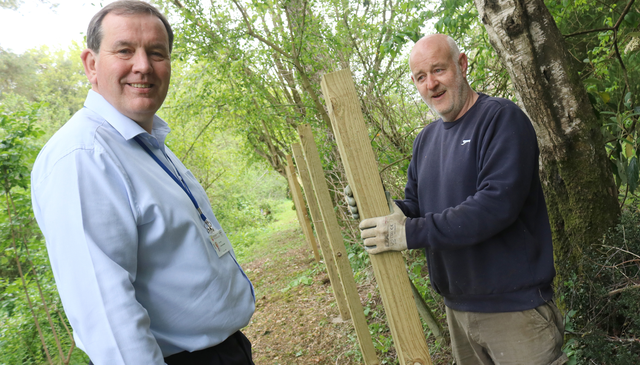
Where our money comes from
The Church of England receives no money from the government to finance its mission and ministry. Our diocese does receive money from investments, a small amount of funding from Church Commissioners, and rental income from houses that we temporarily don’t need to house clergy.
So the voluntary contributions from our parishes, which we call parish share, makes up more than half of our income as a diocese. It’s thanks to your generosity that we can afford to provide clergy and others on the frontline and maintain a significant presence for the Church in people’s daily lives. You raise an amazing £4.4m each year to allow us to do this.
The money doesn’t just allow us to maintain the status quo. We use some of your generous contributions, alongside some funding from the national Church of England, to fund exciting new initiatives that are designed to safeguard the Church’s future.
Parish share is a system that depends on generous and gracious giving by individual churchgoers for whom this is a vital part of their Christian discipleship. It’s a commitment by you to ensure that the work of the Church continues in places where resources are more scarce. Before Covid, it was based on a transparent formula that tried to take into account the size of different congregations and the ability of individual churchgoers to donate. The precise details of this formula are regularly reviewed, as is happening now.
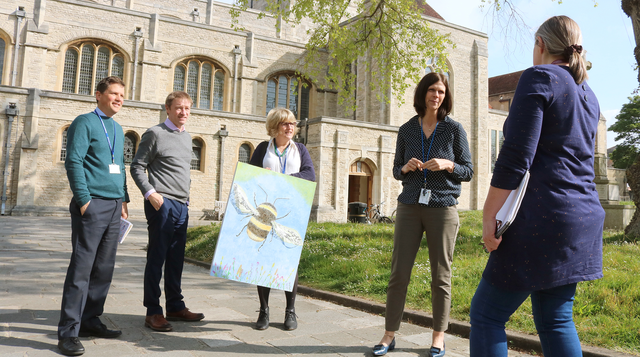
Some myths about our finances
You may have heard these kind of comments made about diocesan finances. Because it’s a complex system, it’s easy for these kind of myths to become part of our thinking:
Q. Why can’t we reduce our central diocesan team in order to reduce parish share?
Our central diocesan staff team is actually fairly small compared to other dioceses, and was reduced as a result of the pandemic (the full-time equivalent of staff funded via parish share is 26). Our central staff team is therefore fairly thinly-stretched at the moment, and any cutting of personnel would significantly affect its ability to effectively support churches and church schools. And some of the tasks they perform are statutory, and therefore have to be performed at diocesan level. But the staffing of our diocesan offices is constantly under review as circumstances change.
Several of those who are employed as diocesan staff are shared between our diocese and Winchester (education and finance officers), or between Portsmouth, Guildford and Winchester dioceses (IT officers). Some are not funded from parish share at all, but from other sources, including those who work for the Council for Social Responsibility and the Good Neighbours Network.
Q. Why is our parish share used to pay for the bishop and cathedral clergy?
It is actually the national Church Commissioners that fund our bishop’s stipend, office, housing and working costs, not our parish share. The Church Commissioners also fund the Dean and two residentiary Canons at our cathedral, rather than through parish share.
The cathedral also contributes financially to our diocese under a separate arrangement, to reflect its unique position as both a parish and a cathedral. Its clergy also regularly volunteer to cover parishes that are in vacancy.
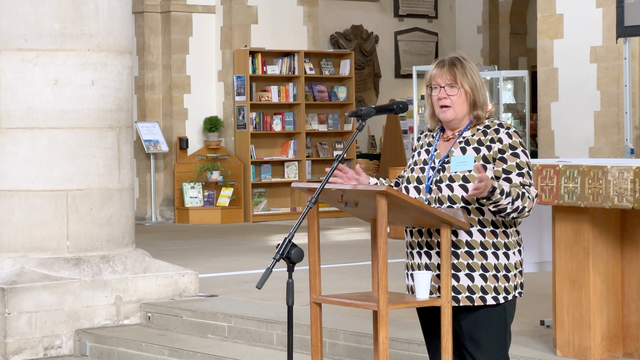
Q. Why does the national church pour so much money into newer initiatives such as Pioneer Ministers and Church Plants?
The Church Commissioners decided to use some of their historic investments to pay for mission initiatives, and dioceses were invited to bid for a share of that funding. The idea was to develop ways of being Church that would appeal to those who are not attracted by more traditional models. That funding does not come from parish share, and it made sense to bid for funds that might offer mission and ministry to those who are unchurched.
Our diocese has been allocated a series of grants, which have helped with the creation of pioneer ministries and church plants, including Harbour Church. These are time-limited grants that help to establish newer initiatives, which it is subsequently hoped might become financially self-sustaining. So, for instance, there was some investment from the national Church in Harbour Church in its first few years as a bishop’s mission order, but it is now a parish that pays parish share according to a similar formula as others.
Q. Why should we pay parish share if we don’t have a vicar?
The aim of the parish share system is that each parish pays according to its means in a fair, transparent way – without any reference to whether that parish happens to have a vicar or not. That means everyone pays money into the central pot, and everyone benefits at some stage from the generosity of others.
It is true that there was a pause on recruitment recently, partly to give parishes and deaneries a chance to put together coherent plans for how best to use clergy, lay ministers and other staff across their whole deanery. Appointments are now being made, and our future processes will aim to fill clergy vacancies as soon as possible.
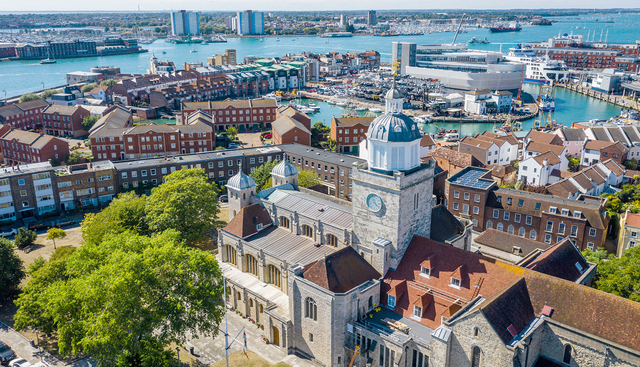
Q. We don’t have to pay parish share!
Of course you don’t have to. It is a voluntary contribution. But if a parish cannot or will not pay the amount agreed, then tough choices have to be made. Either other parishes have to meet the shortfall, or we need to take difficult decisions about where to allocate limited resources, or we need to borrow money from elsewhere.
We trust in a generous God, whose nature is love. We aim to reflect his generous, gracious nature in the way we work together across our diocesan family. That’s why we emphasise the importance of supporting each other in this way.
Find out more on portsmouth.anglican.org/parishshare.
You can download this page as a PDF, set up ready to print as a double-sided booklet. Follow the instructions on the document page to set up your printer correctly.
Latest documents
Parish Share Review Group
In November 2024, our Diocesan Synod agreed with the recommendations of our Parish Share Review Group about how to calculate parish share payments for each parish. You can read their report here. Among the recommendations is one that suggests any parish that finds its parish share unaffordable should be able to have constructive dialogue with the Diocesan Secretary, alongside greater openness and transparency about finances overall.
The group decided that the calculations around parish share should still be based on a measure of Average Weekly Attendance, but calculated over a three, four and then five-year rolling average, to ensure all figures are post-Covid ones. It should also be based on relative affluence, based on the average net disposable income for each parish. Synod members heard there would also be comprehensive transitional arrangements to smooth over the effects of large changes, upwards or downwards, in the amount of parish share requested from each parish from 2025 onwards.
Diocesan Synod voted to accept the proposed changes. For full details, click here.
Parish Share update
Since the approval of the new method of working out Parish Share, diocesan officers have been calculating initial figures, using this new formula and taking into account a three-year transition period. Data has been checked with archdeacons, area deans and, in some cases, individual parishes before being used. Increases in payments by individual parishes have been capped at five per cent. So no parish will face an increase of more than five per cent, compared to the request they received in 2024 (apart from a tiny number of parishes in receipt of strategic funding). Some of the potential reductions in payments have also been moderated. In some cases, specific special arrangements are in place.
Our Diocesan Secretary Philip Poulter has recorded this video to explain the process in more detail.
